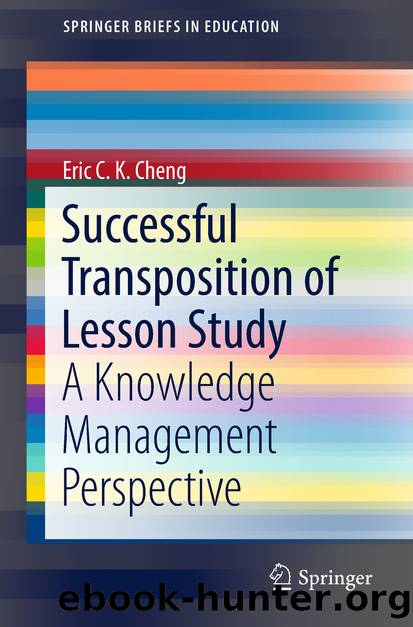Successful Transposition of Lesson Study by Eric C. K. Cheng

Author:Eric C. K. Cheng
Language: eng
Format: epub
ISBN: 9789811324727
Publisher: Springer Singapore
3.1.4 Internalization
Internalization is the process by which the individual understands and absorbs the collective explicit knowledge through practicing the explicit knowledge. It is a mode that retransforms the organizational knowledge that has been externalized into individual tacit knowledge. The organization’s formal knowledge that has been created by the combination process is iteratively reconstructed, both in practice and in one’s own mind. It is thus combined with one’s own situation and other knowledge. As a result, the internalization process of accepting it as new “tacit knowledge” happens. Internalization is not just practised. It should be conducted subjectively and consciously.
The knowledge internationalization process involves the concept of learning by doing: organizational explicit knowledge is learned by the individual through his or her professional practices (Nonaka and Takeuchi 1995, p. 78). It is through internalization (of explicit knowledge into tacit knowledge) that knowledge is incorporated into the school’s operational activities to achieve a practical result. The knowledge assets obtained in the aforementioned socialization, externalization, and combination processes become valuable when they are internalized as individual tacit knowledge. Learning by doing is an essential part of the internalization process. In Lesson Study, the research lesson is taught by one of the teachers in the group and observed by others. The teachers who enact the lesson plan and explicit teaching theories can then understand and absorb the explicit knowledge and internalize the tacit knowledge through enacting the lesson plan. Tacit knowledge is accumulated by the owner through actually doing or through simulations. Enacting the lesson plan is an internalization process that transfers school and team’s explicit knowledge to the individual. As teachers apply the knowledge shared in the lesson planning to their teaching practices, the explicit knowledge is internalized as their personal knowledge (Kolb 1984).
These four modes of socialization, externalization, combination and internalization, as part of the knowledge convention process shown above, do not end with one rotation. They create knowledge by repeating in an ascending knowledge spiral. This SECI model creates personal professional knowledge. It is important that the rotation is an ongoing process.
Download
This site does not store any files on its server. We only index and link to content provided by other sites. Please contact the content providers to delete copyright contents if any and email us, we'll remove relevant links or contents immediately.
Hit Refresh by Satya Nadella(9140)
The Compound Effect by Darren Hardy(8973)
Change Your Questions, Change Your Life by Marilee Adams(7786)
Nudge - Improving Decisions about Health, Wealth, and Happiness by Thaler Sunstein(7711)
The Black Swan by Nassim Nicholas Taleb(7134)
Deep Work by Cal Newport(7089)
Rich Dad Poor Dad by Robert T. Kiyosaki(6640)
Daring Greatly by Brene Brown(6516)
Principles: Life and Work by Ray Dalio(6456)
Playing to Win_ How Strategy Really Works by A.G. Lafley & Roger L. Martin(6315)
Man-made Catastrophes and Risk Information Concealment by Dmitry Chernov & Didier Sornette(6022)
Big Magic: Creative Living Beyond Fear by Elizabeth Gilbert(5778)
Digital Minimalism by Cal Newport;(5767)
The Myth of the Strong Leader by Archie Brown(5511)
The Slight Edge by Jeff Olson(5420)
Discipline Equals Freedom by Jocko Willink(5391)
The Motivation Myth by Jeff Haden(5214)
The Laws of Human Nature by Robert Greene(5212)
Stone's Rules by Roger Stone(5089)
